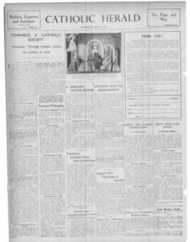Page 16, 6th April 1935
Page 16

Report an error
Noticed an error on this page?If you've noticed an error in this article please click here to report it.
Tags
Share
Related articles
Towards A Catholic Society An Anglican's Suggestion
A Very Large Number Of Letters Are Unavoidably Held Over...
Cardinal Warns
Towards A Catholic Society The Question Of Immunity
Letters To The
TOWARDS A CATHOLIC SOCIETY
"Immunity" Through Catholic Action
THE EXAMPLE OF SPAIN
By the RhA . A.1.1 Di:, I .t: I T
Il'atiout, St.vIN, Mu:cm HAVE, been much interested by the articles of .Mr. 'Wall on the subject uf building up a Catholic society in Fn land, and l particularly endorse what he says about the need for spiritual formation and life, as above all else., the ;i114.. qua. 11,.)it ijf all Catholic Action. Tliii, after all, is not saying any more than has been repeatedly in.!,isteil on by thc present Holy Father, and here in iiptliti, ,Iti in Italy and everywhere. where Catholic Action, in the strict. .ctist.' cif the term, is established, the greatest importance is given to the :ysternatic training of the laity. and still more of the youth groups, in the principles of the spiritual life as NCell a:i in Conlon(' apologetics and culture, ill order to prepare them for their sacred ta,k of participating-, directly, in the miniArv of the clergy.
Catholic Action in a Nutshell
I , It is not, I think, yet generally realised
Iin 1.:,ngland that Catholic Action, a.s instituted by Pope Pius XI and put into practice on the Continent, is not nicrely action by Catholics in the generic sense of the word, but a special, definite organization. on a parochial basis, of the co-operation of the laity in thc mission of the clergy. All odic] existing societies, as also the usual parochial confraternitie,;, etc., are quite another thing. They arc not .t,., be supplanted by Catholic Action; .1.1.1cy tirc to continue independently or, as may suit, in a subsidiary position ,. to it. . Tu !,:.ct ill a nutiliell the formula of the matcuial object ,i. Catholic Actii n. subtract from the work of the clergy the actual administration-of the sacra ments, and, of course, the power of order and jurisdiction. and you have all that the laity may do in a parish or, on a larr >rale, in a diocese—visiting of thc -id:. of lapsed Catholics, eatechiziii, teaching-, and all sorts of religiom: propa,„:;anda.
Under Episcopal Guidance
This apostulate is to be carried out entirely' under the authority and ' guidance of the hierarchy and the parit:11 pill priests, who arc the sole judges of Ivhat work is to be done, and by 1vlioni, and how and When. ... , But in ,,rder that capable members of , Catholic Action may be formed, and above all that Christ be first formed in ,thern hcfort. they begin to exercise their apostolatc, a thorough training of several Nears is gone through in the male and female groups in each parish, by means of collective arts of religion, retreats, and study circles, in which ... the aspirants gradually deepen their religious life and their liturgical spirit, besides acquiring a thorough grounding in the intellectual side of their religion and in social qui,stions.
This is, in actual fact, the new ' lay order " of which Mr. Wall speaks. The thing is there already, and will doubtless. in cltie. course, be extenticd to Eng , lam] by the bishops. when they judge I. that conditions are ripe for the work. How It Works in Spain .. All this is much easier to organize in a Catholic country, where numbers and means are so nnicit more plentiful. What I have sccn here fill, mr. with admiration. . . . [Among the young people concerned] there is not the slightest trace of prigisliness or the wrung kind of piety; first things arc put first, and the groups arc far more than social parish clubs in the old sense. The dominating force is 'intense desire I: of apostolate and of sett\ ice' to the . Church and the clergy, with complete and eager submission lr, authority. • But the actual management. of all the brauches of Catholic Action, men, , -women. and both sections of youth. i.,, ill lay hands. They run their own circles and the diocesan, and national 'boards are composed of laymen, under the direction of the hierarchy and the parish priests, with the specialised cooperation of certain priest i called ecclesiastical counsellors for each dio 1 cesan branch. . English Catholics Must Not Be Isolated The whole theory and practice may he studied in Mgr. Civardi's classic work, Mannalc di Azione Catiolica, at any rate on the Italian model, which it is desired by his 1-Ioliness should serve us a guide: mutafis uttitaddis. for Other eoun tries, ' igree eii:itely with Mr. Wall that English Catholics cannot afford to isolate themselves from the rest of the Church in these matters. There vill he quite eno1l11 that ‘vill have in he adapted in any Cd-r, and the Church
al w ay s respects le1.2.itimate. national eliaraeteristic.., In. out_ secs for instance
here, where Action, though built on the ltalian model, i= most strongly Spanish i and patriotic in tone, whilst, of course, entirely distinct from any political party....
l'his systematic training, by deepen;tig the spiritual life of the individual. enlightening Ins mind and steadying it's Illill against temptation and human respect, makes his 'active life far more fruitful and protects his apostolate from all those infiltrations of worldliness, self-interest and class hatred which so easily creep in under the guise of activity and " helpfulness."
Thus, I think. alone can a solution be found to the problem of "immunity" which rightly exercises your readers. Immunity, not isolation, and precisely by prophylactic means.
blog comments powered by Disqus

















